Yundang Lake in Xiamen witnesses ecological transformation
 0 Comment(s)
0 Comment(s) Print
Print E-mail Xinhua, February 22, 2024
E-mail Xinhua, February 22, 2024
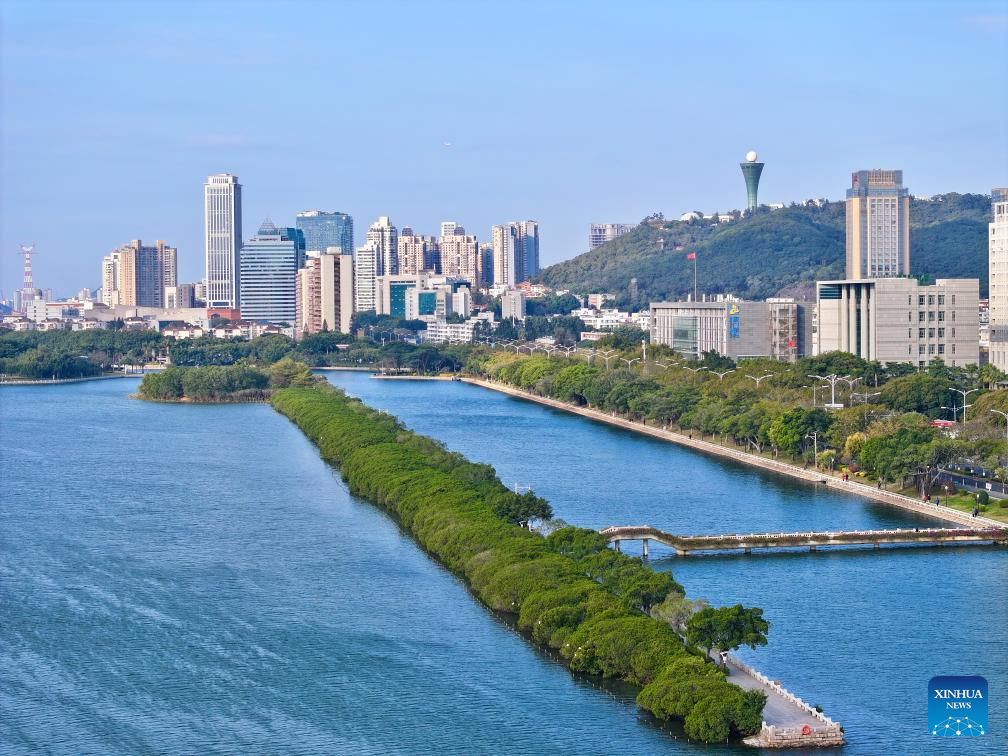
An aerial drone photo taken on Jan. 24, 2024 shows the mangrove forest beside the Yundang Lake in Xiamen, southeast China's Fujian Province. The Yundang Lake basin covers an area of 37 square km. Once a harbor connected to the sea, it was well known for its fishing culture.
In the 1970s, people reclaimed land from the sea in order to increase grain production, and Yundang became an inner lake. As the population and factories increased, water pollution grew steadily. Industrial wastewater from over 100 factories was discharged directly into the lake, together with untreated sewage from hundreds of thousands of local residents.
In the mid-to-late 1980s, various measures were implemented to turn the tide and restore the lake to its former state of health. Industrial enterprises around the lake were all shut down and relocated, sewage plants were built, and seawater was channeled into the lake to revitalize the water body.
With the efforts over the past 30-plus years, Yundang Lake, presently dubbed as the "city's drawing room," now features clear water and abundant aquatic life, serving as a scenic spot for residents and tourists alike. (Xinhua/Jiang Kehong)
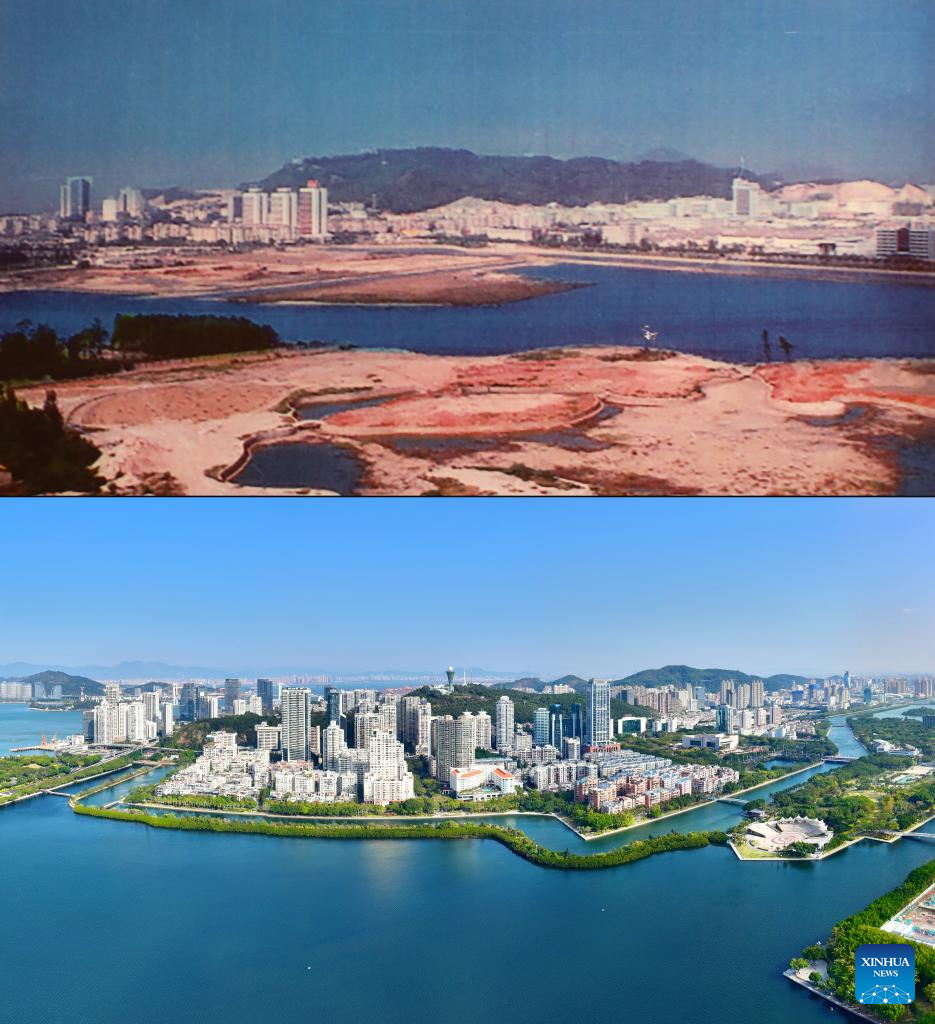
This combo photo shows Yundang Lake in Xiamen, southeast China's Fujian Province, pictured in the 1980s (above, file photo) and a view of Yundang Lake and its surroundings pictured on Jan. 24, 2024 (below, aerial drone photo taken by Jiang Kehong). The Yundang Lake basin covers an area of 37 square km. Once a harbor connected to the sea, it was well known for its fishing culture.
In the 1970s, people reclaimed land from the sea in order to increase grain production, and Yundang became an inner lake. As the population and factories increased, water pollution grew steadily. Industrial wastewater from over 100 factories was discharged directly into the lake, together with untreated sewage from hundreds of thousands of local residents.
In the mid-to-late 1980s, various measures were implemented to turn the tide and restore the lake to its former state of health. Industrial enterprises around the lake were all shut down and relocated, sewage plants were built, and seawater was channeled into the lake to revitalize the water body.
With the efforts over the past 30-plus years, Yundang Lake, presently dubbed as the "city's drawing room," now features clear water and abundant aquatic life, serving as a scenic spot for residents and tourists alike. (Xinhua)
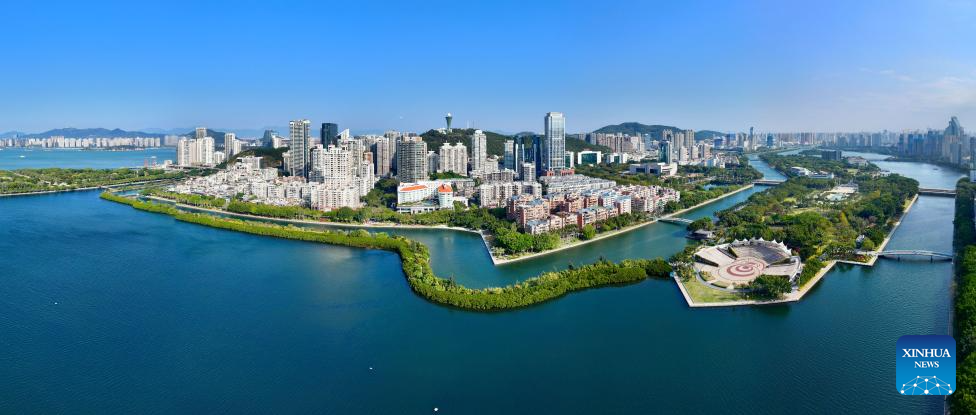
An aerial panoramic drone photo taken on Jan. 24, 2024 shows a view of Yundang Lake and its surroundings in Xiamen, southeast China's Fujian Province. The Yundang Lake basin covers an area of 37 square km. Once a harbor connected to the sea, it was well known for its fishing culture.
In the 1970s, people reclaimed land from the sea in order to increase grain production, and Yundang became an inner lake. As the population and factories increased, water pollution grew steadily. Industrial wastewater from over 100 factories was discharged directly into the lake, together with untreated sewage from hundreds of thousands of local residents.
In the mid-to-late 1980s, various measures were implemented to turn the tide and restore the lake to its former state of health. Industrial enterprises around the lake were all shut down and relocated, sewage plants were built, and seawater was channeled into the lake to revitalize the water body.
With the efforts over the past 30-plus years, Yundang Lake, presently dubbed as the "city's drawing room," now features clear water and abundant aquatic life, serving as a scenic spot for residents and tourists alike. (Xinhua/Jiang Kehong)
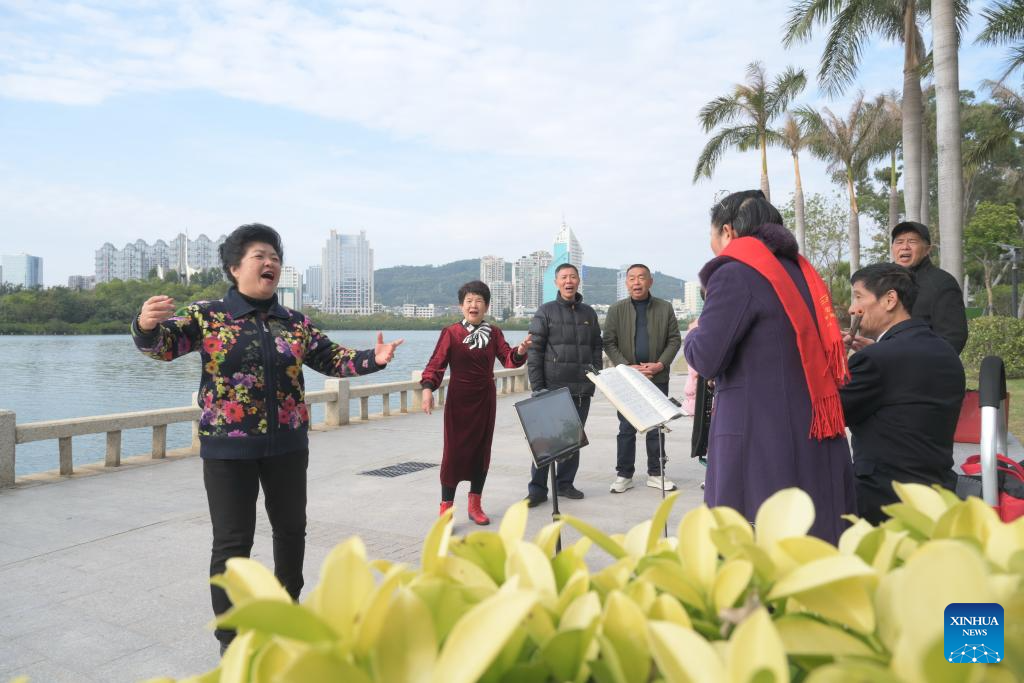
People have fun at a park beside the Yundang Lake in Xiamen, southeast China's Fujian Province, Jan. 24, 2024. The Yundang Lake basin covers an area of 37 square km. Once a harbor connected to the sea, it was well known for its fishing culture.
In the 1970s, people reclaimed land from the sea in order to increase grain production, and Yundang became an inner lake. As the population and factories increased, water pollution grew steadily. Industrial wastewater from over 100 factories was discharged directly into the lake, together with untreated sewage from hundreds of thousands of local residents.
In the mid-to-late 1980s, various measures were implemented to turn the tide and restore the lake to its former state of health. Industrial enterprises around the lake were all shut down and relocated, sewage plants were built, and seawater was channeled into the lake to revitalize the water body.
With the efforts over the past 30-plus years, Yundang Lake, presently dubbed as the "city's drawing room," now features clear water and abundant aquatic life, serving as a scenic spot for residents and tourists alike. (Xinhua/Lin Shanchuan)
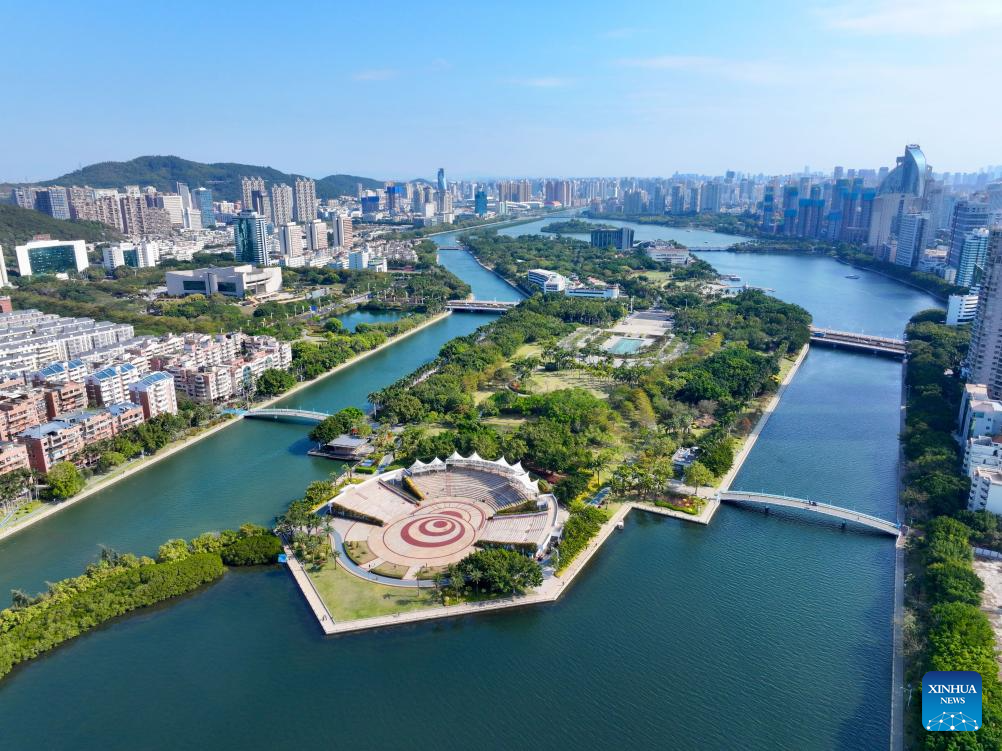
An aerial drone photo taken on Jan. 24, 2024 shows a view of the Bailuzhou Park beside the Yundang Lake in Xiamen, southeast China's Fujian Province. The Yundang Lake basin covers an area of 37 square km. Once a harbor connected to the sea, it was well known for its fishing culture.
In the 1970s, people reclaimed land from the sea in order to increase grain production, and Yundang became an inner lake. As the population and factories increased, water pollution grew steadily. Industrial wastewater from over 100 factories was discharged directly into the lake, together with untreated sewage from hundreds of thousands of local residents.
In the mid-to-late 1980s, various measures were implemented to turn the tide and restore the lake to its former state of health. Industrial enterprises around the lake were all shut down and relocated, sewage plants were built, and seawater was channeled into the lake to revitalize the water body.
With the efforts over the past 30-plus years, Yundang Lake, presently dubbed as the "city's drawing room," now features clear water and abundant aquatic life, serving as a scenic spot for residents and tourists alike. (Xinhua/Jiang Kehong)

An aerial drone photo taken on Jan. 24, 2024 shows people having fun at the Bailuzhou Park beside the Yundang Lake in Xiamen, southeast China's Fujian Province. The Yundang Lake basin covers an area of 37 square km. Once a harbor connected to the sea, it was well known for its fishing culture.
In the 1970s, people reclaimed land from the sea in order to increase grain production, and Yundang became an inner lake. As the population and factories increased, water pollution grew steadily. Industrial wastewater from over 100 factories was discharged directly into the lake, together with untreated sewage from hundreds of thousands of local residents.
In the mid-to-late 1980s, various measures were implemented to turn the tide and restore the lake to its former state of health. Industrial enterprises around the lake were all shut down and relocated, sewage plants were built, and seawater was channeled into the lake to revitalize the water body.
With the efforts over the past 30-plus years, Yundang Lake, presently dubbed as the "city's drawing room," now features clear water and abundant aquatic life, serving as a scenic spot for residents and tourists alike. (Xinhua/Jiang Kehong)
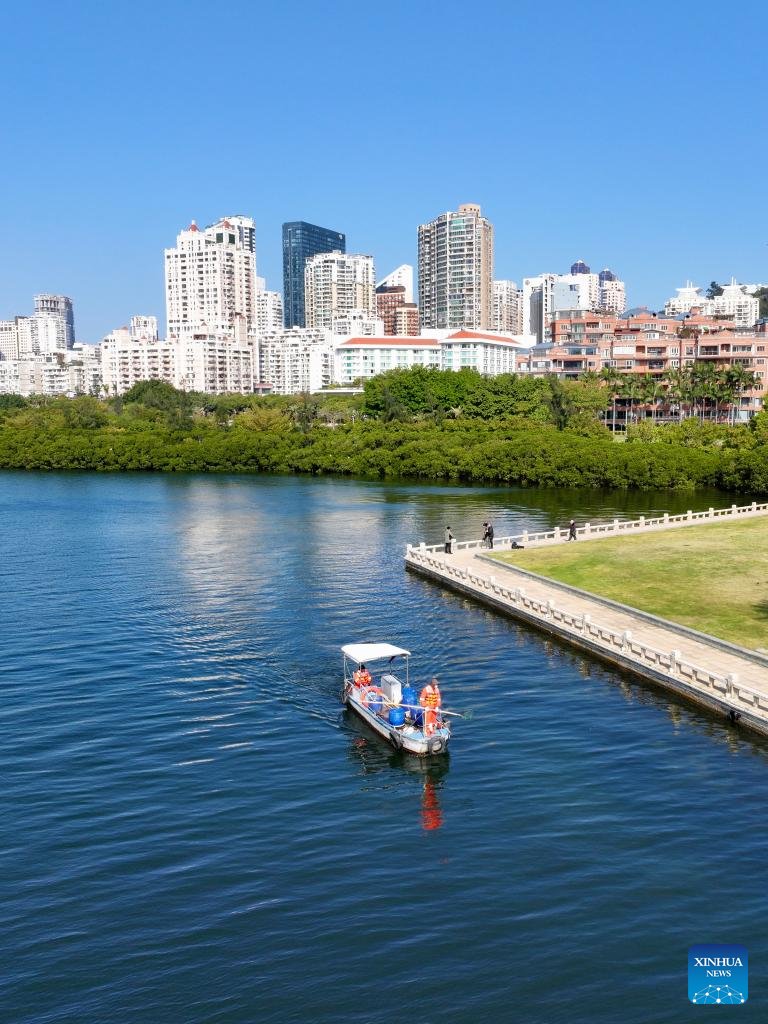
An aerial drone photo taken on Jan. 24, 2024 shows a sanitation boat sailing on the Yundang Lake in Xiamen, southeast China's Fujian Province. The Yundang Lake basin covers an area of 37 square km. Once a harbor connected to the sea, it was well known for its fishing culture.
In the 1970s, people reclaimed land from the sea in order to increase grain production, and Yundang became an inner lake. As the population and factories increased, water pollution grew steadily. Industrial wastewater from over 100 factories was discharged directly into the lake, together with untreated sewage from hundreds of thousands of local residents.
In the mid-to-late 1980s, various measures were implemented to turn the tide and restore the lake to its former state of health. Industrial enterprises around the lake were all shut down and relocated, sewage plants were built, and seawater was channeled into the lake to revitalize the water body.
With the efforts over the past 30-plus years, Yundang Lake, presently dubbed as the "city's drawing room," now features clear water and abundant aquatic life, serving as a scenic spot for residents and tourists alike. (Xinhua/Jiang Kehong)
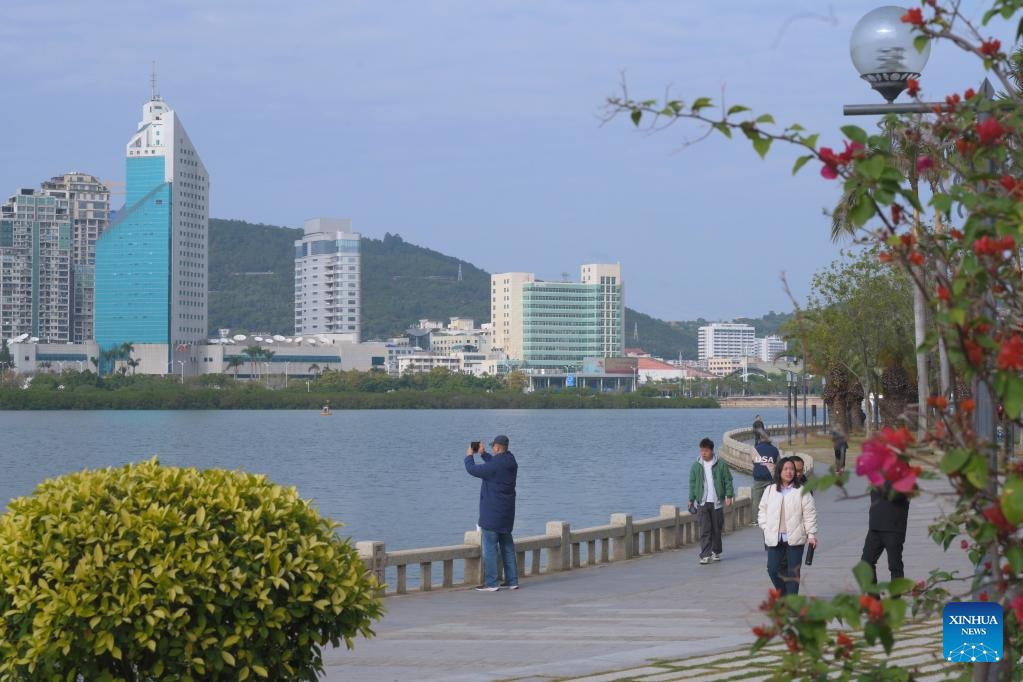
People walk alongside the Yundang Lake in Xiamen, southeast China's Fujian Province, Jan. 24, 2024. The Yundang Lake basin covers an area of 37 square km. Once a harbor connected to the sea, it was well known for its fishing culture.
In the 1970s, people reclaimed land from the sea in order to increase grain production, and Yundang became an inner lake. As the population and factories increased, water pollution grew steadily. Industrial wastewater from over 100 factories was discharged directly into the lake, together with untreated sewage from hundreds of thousands of local residents.
In the mid-to-late 1980s, various measures were implemented to turn the tide and restore the lake to its former state of health. Industrial enterprises around the lake were all shut down and relocated, sewage plants were built, and seawater was channeled into the lake to revitalize the water body.
With the efforts over the past 30-plus years, Yundang Lake, presently dubbed as the "city's drawing room," now features clear water and abundant aquatic life, serving as a scenic spot for residents and tourists alike. (Xinhua/Lin Shanchuan)
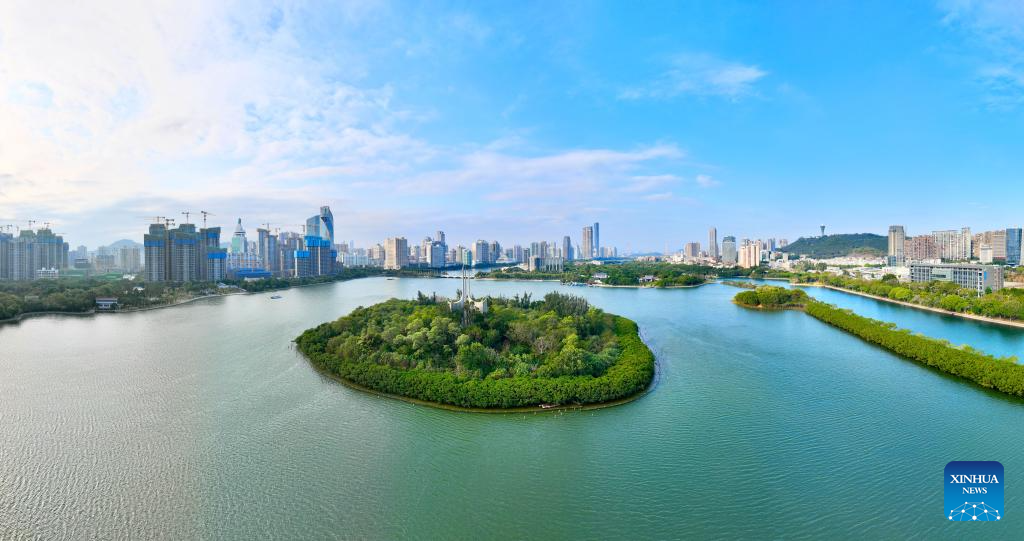
An aerial panoramic drone photo taken on Jan. 24, 2024 shows a view of Yundang Lake and its surroundings in Xiamen, southeast China's Fujian Province. The Yundang Lake basin covers an area of 37 square km. Once a harbor connected to the sea, it was well known for its fishing culture.
In the 1970s, people reclaimed land from the sea in order to increase grain production, and Yundang became an inner lake. As the population and factories increased, water pollution grew steadily. Industrial wastewater from over 100 factories was discharged directly into the lake, together with untreated sewage from hundreds of thousands of local residents.
In the mid-to-late 1980s, various measures were implemented to turn the tide and restore the lake to its former state of health. Industrial enterprises around the lake were all shut down and relocated, sewage plants were built, and seawater was channeled into the lake to revitalize the water body.
With the efforts over the past 30-plus years, Yundang Lake, presently dubbed as the "city's drawing room," now features clear water and abundant aquatic life, serving as a scenic spot for residents and tourists alike. (Xinhua/Jiang Kehong)
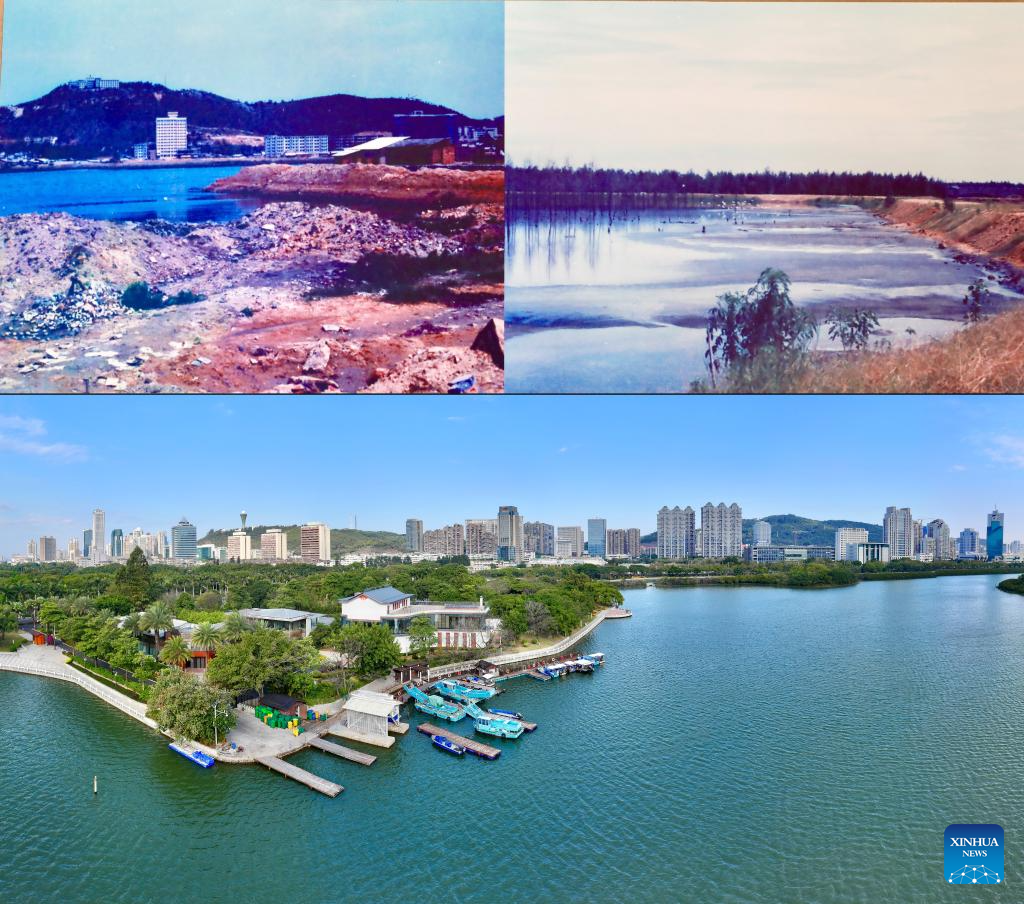
This combo photo shows Yundang Lake in Xiamen, southeast China's Fujian Province, pictured in the 1980s (above, file photos) and a view of Yundang Lake and its surroundings pictured on Jan. 24, 2024 (below, aerial drone photo taken by Jiang Kehong). The Yundang Lake basin covers an area of 37 square km. Once a harbor connected to the sea, it was well known for its fishing culture.
In the 1970s, people reclaimed land from the sea in order to increase grain production, and Yundang became an inner lake. As the population and factories increased, water pollution grew steadily. Industrial wastewater from over 100 factories was discharged directly into the lake, together with untreated sewage from hundreds of thousands of local residents.
In the mid-to-late 1980s, various measures were implemented to turn the tide and restore the lake to its former state of health. Industrial enterprises around the lake were all shut down and relocated, sewage plants were built, and seawater was channeled into the lake to revitalize the water body.
With the efforts over the past 30-plus years, Yundang Lake, presently dubbed as the "city's drawing room," now features clear water and abundant aquatic life, serving as a scenic spot for residents and tourists alike. (Xinhua)
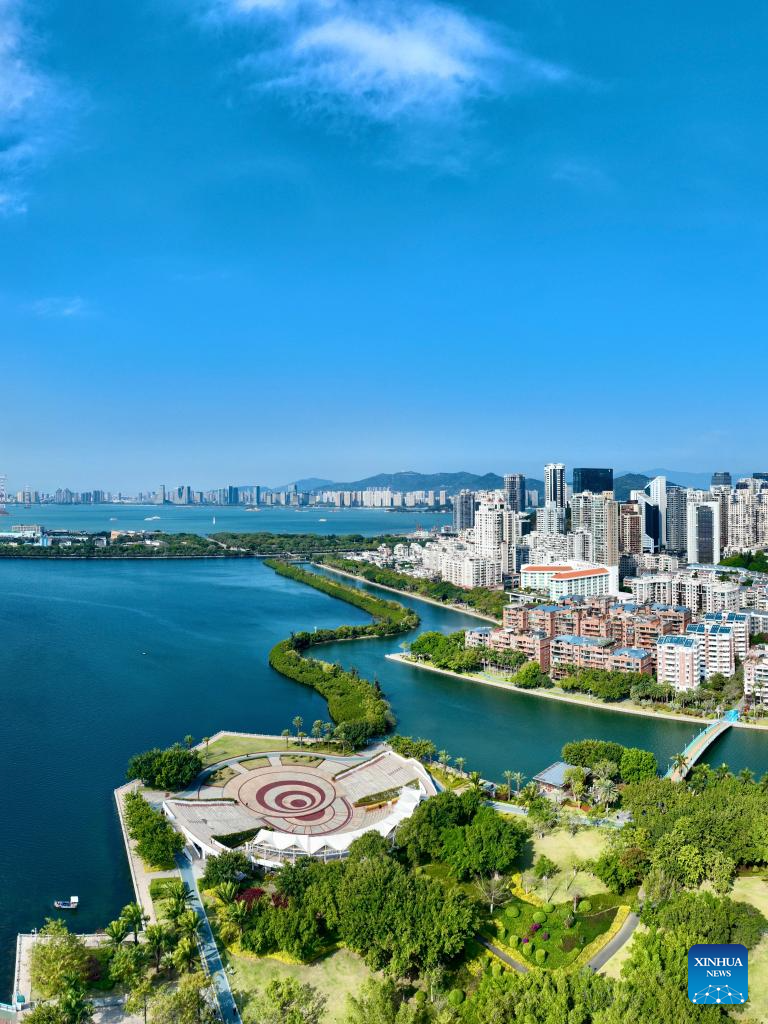
An aerial drone photo taken on Jan. 24, 2024 shows a view of the Bailuzhou Park beside the Yundang Lake in Xiamen, southeast China's Fujian Province. The Yundang Lake basin covers an area of 37 square km. Once a harbor connected to the sea, it was well known for its fishing culture.
In the 1970s, people reclaimed land from the sea in order to increase grain production, and Yundang became an inner lake. As the population and factories increased, water pollution grew steadily. Industrial wastewater from over 100 factories was discharged directly into the lake, together with untreated sewage from hundreds of thousands of local residents.
In the mid-to-late 1980s, various measures were implemented to turn the tide and restore the lake to its former state of health. Industrial enterprises around the lake were all shut down and relocated, sewage plants were built, and seawater was channeled into the lake to revitalize the water body.
With the efforts over the past 30-plus years, Yundang Lake, presently dubbed as the "city's drawing room," now features clear water and abundant aquatic life, serving as a scenic spot for residents and tourists alike. (Xinhua/Jiang Kehong)
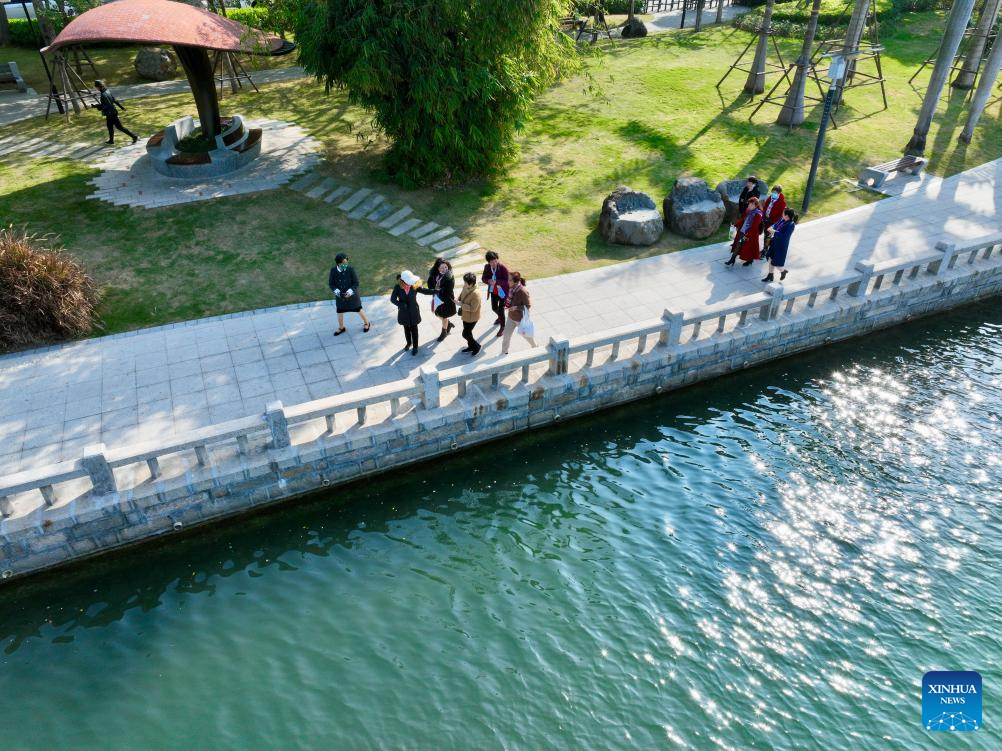
An aerial drone photo taken on Jan. 24, 2024 shows people walking alongside the Yundang Lake in Xiamen, southeast China's Fujian Province. The Yundang Lake basin covers an area of 37 square km. Once a harbor connected to the sea, it was well known for its fishing culture.
In the 1970s, people reclaimed land from the sea in order to increase grain production, and Yundang became an inner lake. As the population and factories increased, water pollution grew steadily. Industrial wastewater from over 100 factories was discharged directly into the lake, together with untreated sewage from hundreds of thousands of local residents.
In the mid-to-late 1980s, various measures were implemented to turn the tide and restore the lake to its former state of health. Industrial enterprises around the lake were all shut down and relocated, sewage plants were built, and seawater was channeled into the lake to revitalize the water body.
With the efforts over the past 30-plus years, Yundang Lake, presently dubbed as the "city's drawing room," now features clear water and abundant aquatic life, serving as a scenic spot for residents and tourists alike. (Xinhua/Jiang Kehong)
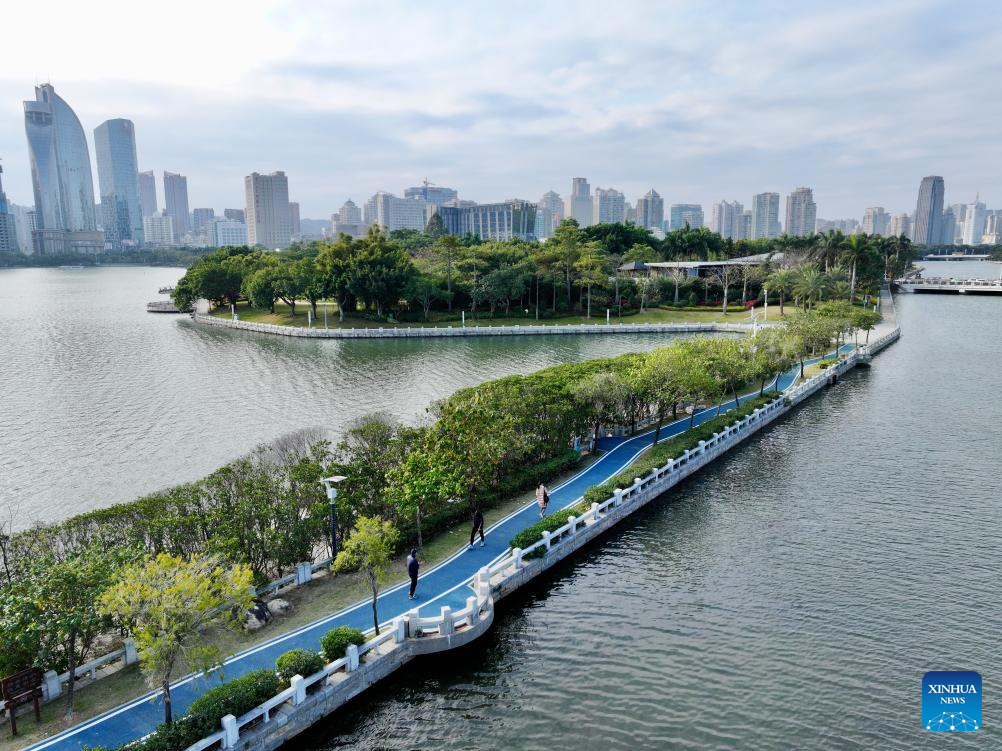
An aerial drone photo taken on Jan. 24, 2024 shows a trail alongside the Yundang Lake in Xiamen, southeast China's Fujian Province. The Yundang Lake basin covers an area of 37 square km. Once a harbor connected to the sea, it was well known for its fishing culture.
In the 1970s, people reclaimed land from the sea in order to increase grain production, and Yundang became an inner lake. As the population and factories increased, water pollution grew steadily. Industrial wastewater from over 100 factories was discharged directly into the lake, together with untreated sewage from hundreds of thousands of local residents.
In the mid-to-late 1980s, various measures were implemented to turn the tide and restore the lake to its former state of health. Industrial enterprises around the lake were all shut down and relocated, sewage plants were built, and seawater was channeled into the lake to revitalize the water body.
With the efforts over the past 30-plus years, Yundang Lake, presently dubbed as the "city's drawing room," now features clear water and abundant aquatic life, serving as a scenic spot for residents and tourists alike. (Xinhua/Jiang Kehong)


